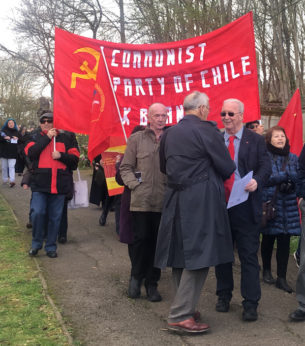
LONDON—It’s only a 40-minute walk up to Karl Marx’s final resting place tucked inside the historic Highgate Cemetery.
Stepping out the front door of my flat in London’s Holloway neighborhood, greeted by cliché English weather, it’s a sharp left turn past the bustling local Islamic community center, and straight up Holloway Road towards Highgate. There’s no need for headphones. The sights, sounds, and delicious scents rising from one of the most diverse London neighborhoods are good enough company during the walk.
Over time, the sounds quiet down and the neighborhoods change. Historic architecture surrounds you—putting America’s 243-year existence into an interesting perspective, and you find yourself staring up at St. Michael’s Cathedral from the corner of Swain’s Lane. It’s a steep climb up to the visitor entrance, but I was joined by several dozen people, and we were greeted by dozens more at the entry kiosk.

It was Sunday, March 17, and socialists, Marxists, communists, and everyone in between, from all over the world, gathered together for the annual Marx Oration. Turnout was high for the event, and the mood somber. Marx’s London tomb stood stained with red paint, its memorial plaque smashed after two separate acts of vandalism in February.
Minister Ma Hui of the Chinese embassy gave this year’s oration, saying: “Marxism is still guiding China’s socialist development, building a community with a shared future for humankind, and an open, inclusive, clean and beautiful world that enjoys lasting peace.”
As the event ended, several foreign embassies including Cuba and Vietnam, along with the Tudeh Party of Iran and the Communist Parties of Chile, Iraq, Cyprus, and Greece, laid flowers and wreaths at the gravestone bowing their heads in respect while raising their fists in solidarity.
Making my way through the crowd, I stopped to shake hands with Robert Griffiths, General Secretary of the Communist Party of Britain (CPB), and asked if he had a few moments to chat.
“Oh, of course,” said Griffiths, an energetic smile on his face. “Always happy to talk with our visiting American comrades.”
He asked what I’ve been up to since arriving in Britain.
“For the most part sitting in the House of Commons for hours on end listening to Brexit debates,” I said.
“Well, my commiseration for having to sit through any parliamentary procedures on Brexit,” Griffiths said mid-chuckle. “You’re probably more confused now than when you first sat down.”
As we walked a bit to get away from the crowd, I asked Griffiths for his initial opinion on the whole Brexit mess.
“The fundamental problem is that we have a predominantly pro-European Union, pro-remain House of Commons that is supposed to be organizing Britain’s exit from the EU in line with the June 2016 referendum results,” he said. “The Prime Minister (Theresa May) is trying to push through what is in effect a semi-Brexit because she is pro-EU, as is most of British big business.”
He continued: “Then you have a large element of the Labour Party who only want a quarter Brexit; you also have some Labour and Conservative Members of Parliament, Liberals, and Nationalists, who don’t want any kind of Brexit at all. And you only have about a quarter of MPs in the House of Commons that want a real Brexit—most of those are conservative and they believe they can build a free market paradise in Britain in alliance with the United States and Singapore and so on.”
A free market paradise…talk about a pie in the sky dream, I thought to myself.
“What’s the left’s general feeling about Brexit?” I asked.

Griffiths says the left in Britain, and particularly the Communist Party, has always opposed the EU, but for quite different reasons than those put forward by the right.
“The EU is a mainstream, big business apparatus whose rules serve the interests of big business and monopoly-dominated markets. Therefore, we have always opposed Britain’s membership in the EU, and we campaigned against remaining in the referendum. And, as I say, we did so on fundamentally very different grounds to a section of the extreme right wing. The mainstream right, like most of big business, is very much in favor of keeping Britain as closely aligned to the EU and single market customs rule as possible. I suspect at the end of all this we’ll probably see a half Brexit, but I think May will do what she proposed to do for big business and organize a Brexit largely in name only.”
I then inquire about Griffiths’ thoughts on the split between rank and file union members who voted to leave, and the leadership of the Trades Union Congress taking up the Remain banner.
“I think there are many on the left, about half of what you can define as broadly the left, are anti-EU, and all of those will be unhappy with the stance the TUC took, and the position the general council of the TUC has taken,” Griffiths argues. “There will even be some, quite a few, that although they campaigned to remain and think on balance it would be better to stay in the EU, they are not enthusiastic about it and they understand many of the EU’s defects and reactionary characteristics even. “Where once the TUC was very critical of the anti-trade union, anti-worker judgments from the EU court of justice, all of that has been forgotten. Without the EU, according to some trade union leaders, we’re not capable of fighting for, or retaining, or winning anything in Britain alone. It’s a profoundly anti-union, anti-labor, anti-working class position, and really it’s been almost an embarrassment to see some of the pronouncements from the TUC on the EU.”
The breeze picked up, and we took a quick pause as people came up around the corner. The issues rank and file members have with labor leaders in the U.K. reminded me of the similar issues facing American union members—the idea that labor is incapable of winning any pro-worker battles without the Democratic Party has long been the narrative. It is only recently that we have seen the much-needed re-emergence of militant organizing throughout the private sector.
I push Griffiths on the question of what will come next, particularly for his organization. “So,” I ask, “what are the Communist Party’s next steps, post-Brexit?”
“Understandably the whole Brexit question has overshadowed political life and struggle in Britain to quite some degree,” Griffiths said, “but there are many important questions…”
“Ah, Robert!” says a member of the Chinese delegation, walking down to shake Griffiths’ hand. “It was great seeing you today, please let me know when you’ll be stopping by the embassy…hopefully soon.”
After shaking hands, Griffiths turned back to me saying, “Sorry about that… Now, where was I… Oh yes…There are huge social and economic and industrial problems here that we need to get a grip on and to some extent they’ve been overshadowed by Brexit.
“But the truth remains that austerity policies must go, privatization must be rolled back, we need a massive redistribution of income and wealth, public ownership of basic industry… There is so much to be done. And of course, our view is what we need besides an early general election is the election of a left-led Labour government which would open up a new stage in the political class struggle of Britain—we stand for that and will fight for it regardless of what happens in the Brexit progress.”
“So, for those across the pond, what advice would you give for understanding Brexit?” I asked.
Griffiths said that British Communists would “urge our friends and comrades on the left in the USA to not believe everything you’re being told about Brexit. Not all the 17.4 million people who voted to leave are racists and bigots and so on. There has been atrocious propaganda peddled by the pro-EU forces in Britain to completely misrepresent the standpoint of most people that voted [to leave] on the grounds of democratic accountability, national sovereignty, and the desire to have the future of the country decided by the people of Britain.
“We know you have a reactionary president in Trump, but we also understand Hillary Clinton might not have been much of an improvement, so you are facing a difficult position. But we also know that the Bernie Sanders campaign and other recent developments have reinvigorated the left, giving a higher profile to socialism. Our duty is to understand what is going on in the States and to support the progress being made.”
I shut off my tape recorder, shook Griffiths’ hand, thanking him for taking the time to talk. I snapped a quick photo and walked with him out to the cemetery’s front gate.
“You joining us for a pint over at the Oak and Pastor?” Griffiths asked.
“Absolutely,” I said. “I would never miss a ‘communist party’.”
People’s World correspondent Al Neal’s earlier Brexit coverage from London and Brussels is available here.










